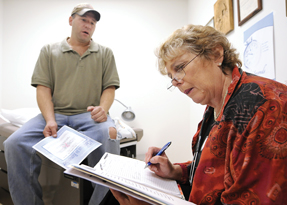Teaching the patient-centered medical home
A growing number of residency programs are training new physicians in the PCMH model, with the hopes of improving patient outcomes and attracting more interest in primary care as a career path.
Most internists are familiar with the idea of the patient-centered medical home (PCMH), which has gained popularity in recent years as a way to provide patients with comprehensive, continuous care. Now, a growing number of residency programs are training new physicians in the PCMH model, with the hopes of improving patient outcomes and attracting more interest in primary care as a career path. In our cover story, Stacey Butterfield looks at programs throughout the country teaching residents to build medical homes from the bottom up, through such innovations as improved teamwork, creative scheduling and increased responsibility.
With HIV infection becoming more of a chronic disease, patients are living longer. In addition, they're more likely to be cared for by internists: Statistics show that while many of the pioneering specialists in the field have begun to retire, fewer new physicians are taking their places, meaning more patients with HIV may begin seeking out primary care physicians. But age brings more comorbid conditions along with effects of lengthy exposure to protease inhibitors, possible uncharted territory for internists unused to caring for HIV in older patients. Charlotte Huff examines what primary care physicians need to know to provide optimum HIV care.
Communication is valuable in all areas of patient care, but it's especially crucial for cancer survivors transitioning from specialists back to primary care physicians. Often, research shows, this transfer is rocky or doesn't occur at all because of lack of communication on both sides, as well as other potential barriers to education and awareness. Our story offers some ways to address these problems and help cancer survivors make a successful transfer back to primary care.
Also in this issue, ACP president Virginia L. Hood, MBBS, MPH, FACP, wrestles with the best way to develop appropriate performance measures, and Robert B. Doherty, ACP's senior vice president for governmental affairs and public policy, debates how physicians can and should contribute to reducing the budget deficit.
Are you seeing more HIV-positive older patients in your practice? What are your opinions about the best way to solve the budget crisis in Washington? Let us know.
Sincerely,
Jennifer Kearney-Strouse





